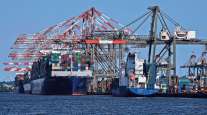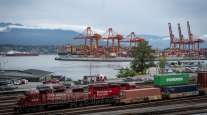Bloomberg News
Strike That Snarled Canada’s Ports to End as Deal Is Reached

[Stay on top of transportation news: Get TTNews in your inbox.]
A 13-day strike that disrupted shipments at Canada’s western ports is set to end after the dockworkers’ union and a group of employers agreed on a tentative deal.
The International Longshore and Warehouse Union, representing more than 7,000 workers, and the British Columbia Maritime Employers Association reached an agreement on a new four-year deal, according to a statement on July 13. The parties didn’t release details.
The agreement paves the way for an end of the work stoppage at ports in Vancouver and Prince Rupert, the country’s busiest and third-busiest hubs. The employers group said operations are expected to “resume as soon as possible.”
Over the past 13 days, the strike at ports that handle a quarter of Canada’s total traded goods reduced arrivals of containerships and diverted vessels to U.S. facilities, impeding imports of materials for manufacturing as well as exports of natural resources like potash.
The Canadian Manufacturers & Exporters trade group estimated the strike caused daily trade disruptions amounting to C$500 million ($380 million). The BCMEA on July 11 put the tally of disrupted cargo at C$8.6 billion so far. The Canadian Chamber of Commerce warned the disruptions could fuel inflation.
Dispatch Alert🚨Work Resumes July 13th 1630 shift. Come down to the hall and plug in for work. @BC_Maritime @500Dispatch pic.twitter.com/S537H6CDPP — BCMEA Vancouver Dispatch (@VanBCDispatch) July 13, 2023
More than half of business owners belonging to the Canadian Federation of Independent Business were affected by the strike through missed sales, delayed production or orders, and the inability to export products. The world’s biggest fertilizer producer, Saskatchewan-based Nutrien Ltd., has cut production at its Cory potash mine, citing the port stoppage.
Want more news? Listen to today's daily briefing below or go here for more info:




